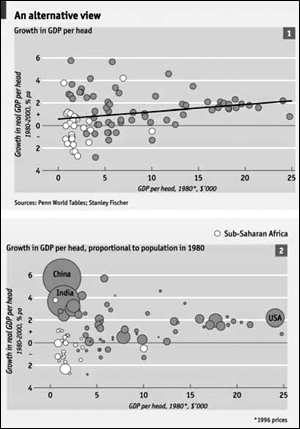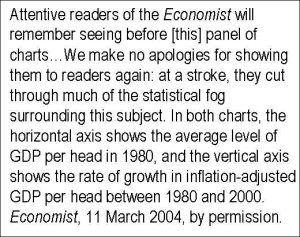Growth and Inequality: Understanding Recent Trends and Political Choices
Growth and Inequality: Understanding Recent Trends and Political Choices
In current debates about the world economy, “growth is good” often appears as a truism. Growth leads to wealth, it is said, and greater wealth is surely desirable, especially for the poorer developing countries. Closer inspection, however, leads to a far more nuanced assessment.
Legend has it that there was a time when economists celebrated economic growth, regardless of its distribution. Such economists would have judged alternative economic practices and policies exclusively by their relative impact on the inflation-adjusted (per capita) social product. I am not sure such economists were ever dominant. Economists have long seen the point of income and wealth in the satisfaction of human preferences and understood that, insofar as such satisfaction increases with rising income or wealth, it does so at a declining rate. At any rate, the legend of the growth-only economists is useful because it allows real economists to stress that they are different, that they favor pro-poor growth, growth-with-equity, or some such thing. This is crucial to their theological role of appeasing the conscience of their wealthy constituents and of reconciling rich and poor alike to the great globalization push of the last twenty-five years. If economic experts committed to equity and eradication of poverty celebrate this push and the growth it produces, how can we withhold our approval?
Consider this example from the Economist (March 11, 2004).
 The message the Economist conveys with these two charts is that critics of recent globalization are mendacious or confused when they complain of inequitable growth: Only when the population size of countries is ignored (as in the top chart) can it appear as though global economic growth is benefiting the rich disproportionately. As soon as population size is taken into account (as in the bottom chart) it becomes clear that the poor are benefiting mightily—the rise of China and India is living proof of this. A further message here conveyed is that globalization’s supporters, such as the Economist, care about poverty and inequity and would not be such ardent supporters if the poor were not benefiting along with the rich.
The message the Economist conveys with these two charts is that critics of recent globalization are mendacious or confused when they complain of inequitable growth: Only when the population size of countries is ignored (as in the top chart) can it appear as though global economic growth is benefiting the rich disproportionately. As soon as population size is taken into account (as in the bottom chart) it becomes clear that the poor are benefiting mightily—the rise of China and India is living proof of this. A further message here conveyed is that globalization’s supporters, such as the Economist, care about poverty and inequity and would not be such ardent supporters if the poor were not benefiting along with the rich.
Who Benefits from Recent Growth?
Growth can benefit rich and poor alike, and thereby reduce poverty. But to what extent has World Trade Organization (WTO) globalization actually done so? The Economist is right to suggest that the top chart cannot answer the question. And it rightly prefers the bottom chart: The added information about population size matters in that, other things being equal, it is better for faster growth to occur in more populous poor countries than in less populous ones.
Nonetheless, the bottom chart cannot settle the matter either. One reason i...
Subscribe now to read the full article
Online OnlyFor just $19.95 a year, get access to new issues and decades' worth of archives on our site.
|
Print + OnlineFor $35 a year, get new issues delivered to your door and access to our full online archives.
|






